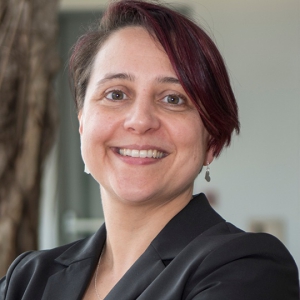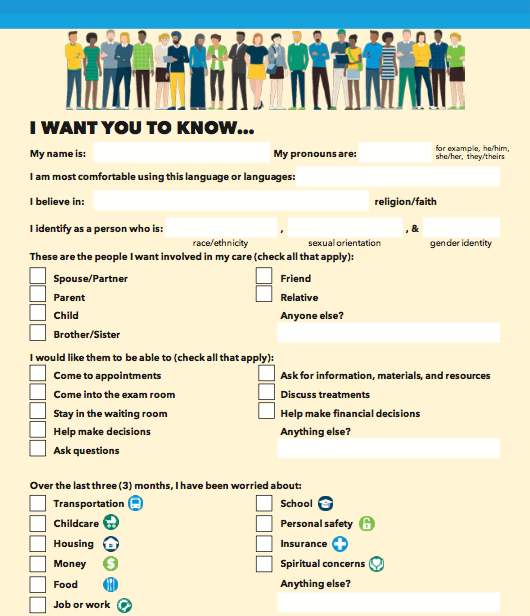Cancer treatment and post-treatment care require a partnership between you and your healthcare team. This partnership requires strong communication among you, your loved ones, and all your healthcare providers.
Healthcare providers can best care for you when you share your values and preferences.
Sharing with Your Care Team
This patient card (see below) can be downloaded at http://bit.ly/TEAMPatientCards, to fill out and share with your care team.
Also share with them personal beliefs and cultural values that may influence the type of treatment you receive or the timing of your care. Let them know what type of work you do, what hobbies are important to you, and what concerns you have about the effects of treatment on those activities.
The National Coalition for Cancer Survivorship Cancer Survival Toolbox (www.canceradvocacy.org/resources/cancer-survival-toolbox/) has tips and tools for talking with your doctor about your unique questions and concerns. You can use the toolbox to build your own communication skills and improve your partnership with your doctor.
Emotional Support
Your healthcare team also benefits from knowing whom you rely on for emotional and practical support. Tell them who your support circle includes, and how you want them involved in your care, if at all.
Some people like to have a family member or a friend present during appointments to take notes and help them make sense of information that can quickly become overwhelming.
Other people ask loved ones to help with meals, housework, or errands to preserve physical energy needed during treatment.
Advance Directives
It is a great idea to have an “advance health directive” in place and on file with your healthcare team, so your wishes are documented in the event that you become unable to advocate for yourself verbally at any point. This is a good idea for everyone, regardless of whether you are facing cancer treatment or not.
Remember, you can always change your advance directive if you change your mind about how you want to be treated.
Financial Worries
If you have worries about the financial impact of treatment, getting to treatment, or how to talk about treatment with your loved ones, ask for help. CancerCare has a handbook to help you manage the financial challenges of cancer treatment.
Patient Resources
GW Cancer Center
“I Want You to Know” card (in English, Spanish, Chinese)
http://bit.ly/TEAMPatientCards
National Coalition for Cancer Survivorship
Cancer Survival Toolbox
www.canceradvocacy.org/resources/communicating-with-your-doctor/
National Cancer Institute
Advance Directives
www.cancer.gov/about-cancer/managing-care/advance-directives
CancerCare
“A Helping Hand: The 2018 Resource Guide for People with Cancer”
https://media.cancercare.org/publications/original/178-helping_
hand.pdf?1380649327
















